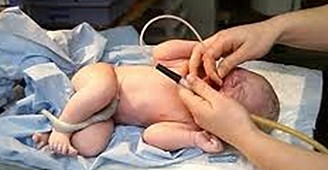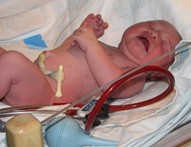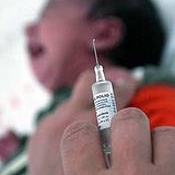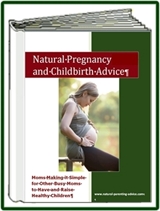|
|
| |
|
Return to Page 1: |
Newborn Tests and Procedures
Suctioning

Of all the newborn tests and procedures, suctioning is the one that is most likely to be overdone.
At most hospitals, suctioning is performed the minute your baby’s head emerges. Since the shoulders haven’t even been born yet, it is the obstetrician that would do this. If you have a hospital based midwife, she may suction your baby at this point if indicated (i.e. your baby has merconium on its head or there was significant merconium in your amniotic fluid). A bulb syringe is usually used at this point, but a suction hose attached to a machine may be used as well.
If suctioning wasn’t preformed prior to birth, your hospital based obstetrician or midwife will usually suction your baby just after he or she is born, often before putting the baby on your chest. Whether or not your baby was suctioned at birth, he or she will often be suctioned again by the pediatrician who examines your baby after birth. The pediatrician is more likely to use a machine to suction your baby, not a bulb syringe.
So why is this a big deal? For the most part, suctioning is entirely unnecessary. When your baby passes thru the birth canal, the squeezing that takes place normally expels any mucus present in their nose and throat the same way the Heimlich maneuver expels blockages when someone is choking.
According to International Guidelines for Neonatal Resuscitation: An Excerpt From the Guidelines 2000 for Cardiopulmonary Resuscitation and Emergency Cardiovascular Care: International Consensus on Science published in PEDIATRICS Vol. 106 No. 3 September 2000, p. e29.
“A minority (fewer than 10%) of newly born infants require active resuscitative interventions to establish a vigorous cry or regular respirations, maintain a heart rate >100 beats per minute (bpm), and achieve good color and tone.” This includes all measures to stimulate a baby to breath and maintain a strong heart rate from simple skin rubbing to administering oxygen and chest compressions.
It is important to know that most babies will not take their first breath until after they have completely exited their mother’s body. After being born they continue to receive oxygen thru their umbilical cord (as long as it hasn’t been clamped or cut) for as long as it continues to pulse. This is nature’s way of giving babies time to adjust to being on the outside and ensure they still receive oxygen as they are working out how to breath for the first time.
As you will discover when your child gets his or her first cold, suctioning is uncomfortable and babies don’t like it. Some babies are suctioned so vigorously by hospital staff that they “squeak” when they cry due to damage to their vocal cords. We prefer that suctioning be performed only when it is indicated so that birth remains as natural a possible and our baby is traumatized as little as possible.
Homebirth midwives generally only suction when indicated. Still, if you have having a homebirth, this is something to ask your midwife about. If you are planning a birth center or hospital birth, suctioning is something you may want to discuss ahead of time with your doctor or midwife as well as document in a “Newborn Tests and Procedures” section of your birth plan.
Weighing and Measuring Length
Almost all babies are weighed and their length is measured. The big decision here is when you want this assessment to take place.
We feel strongly that all assessments should take place after you have had at least an hour to bond with and breastfeed your baby. We also recommend that you have this and all other tests done in your presence so that you are never separated from your baby.
Baby’s First Bath

Hospital protocol is to wash your baby soon after birth. From the hospital perspective, your baby is covered with vernix and potentially your blood. They do not want their staff exposed to your blood when they handle your baby.
From your perspective, your baby is covered with vernix, a white cheesy like substance that protected your baby’s skin in the womb and is a wonderful moisturizer. Vernix is not dirty and it does not need to be removed. Rather than wiping it off, it is much better for your baby if you massage this wonderful natural moisturizer into your baby’s skin.
There are many downsides to having your baby bathed in the hospital. First, it is cold in most hospital rooms, too cold for a baby to be uncovered, bathed and dried without having trouble regulating his or her temperature. The procedure in the hospital is usually traumatic with baby crying and often shaking due to being upset, cold or both. Either way, the shaking will often be interpreted by the hospital staff as low blood sugar (see our example above of where this can lead).

Most babies are born with borderline low blood sugar, this is natural, so if you allow them to test your baby’s blood sugar - especially soon after he or she is born - it is likely that the test will result in borderline low blood sugar requiring your baby to undergo hourly blood sugar testing for a period of time.
Alternatively, if your baby’s temperature goes down due to becoming chilled while being bathed, further inventions will be prescribed to “fix” the problem. All of this adds up to you being separated your baby AND unnecessary pain for your baby. We view this a lose – lose situation.
It is much better to delay bathing until your baby has had time to bond with you (skin on skin) as well as to nurse for several hours. Better yet, refuse to let them bathe your baby altogether. Instead, rub the vernix into your baby’s skin and reserve baby’s first bath as something you do together in a warm bathroom at home.

You will have to sign a waiver refusing the bath. Hospital personnel will also likely insist on wearing gloves when they handle your baby to prevent them being exposed to your blood.
At natural parenting advice we prefer that they wear gloves since we are much more worried about our baby being exposed to germs the nurses have picked up in their rounds than them being exposed to anything from our own blood (routine blood testing for STD's is common during pregnancy).
Umbilical Cord Clamping and Cutting
Of all the newborn tests and procedures, early cord clamping may be the most harmful.
As we already discussed, your baby’s umbilical cord continues to provide your baby with oxygen for an average of seven minutes after your baby is born. It really is a miracle the way your baby’s body completely changes the way it receives oxygen and nourishment shortly after being born.
Blood from the placenta is transferred into your baby providing it the additional blood it needs to profuse his or her lungs and provide pulmonary (lung) circulation. Unless there is some kind of emergency, your choices are to have the cord clamped immediately or to have the cord clamping delayed.

Immediate cord clamping can cause many problems ranging from your baby being deprived of oxygen while he or she figures out how to breathe to anemia caused by half of his or her blood volume (approx 100ml) being left behind in the cord.
By clamping your baby’s cord early you also deprive your baby of its full quota of stem cells. Stem cells present in the umbilical cord will migrate to your baby’s bone marrow soon after birth and transform themselves into various types of blood-making cells.
Sarah Buckley, MD has a very detailed article about the negative effects of early cord clamping.
At natural parenting advice, be believe that the umbilical cord should not be clamped or cut until after your baby has breathing regularly and the cord has completely stopped pulsing.
Eye Ointment
Eye ointment might be the most ridiculous of the newborn tests and procedures.
Eye ointment is routinely administered to all babies to protect the few that are born to mothers with active Gonorrhea or Chlamydia infections from going blind.
In the past, silver nitrate was commonly used which stung and swelling of the eyes and blurred vision for the first few days of life.
Now it is common to use Erythromycin ointment. Although Erythromycin does not sting, your baby’s vision will be blurred, making it harder to bond.
If you know that you do not have Gonorrhea or Chlamydia, there is absolutely no need to have eye ointment applied to your baby’s eyes.PKU Testing – AKA Newborn Screening

PKU testing is the most confusing of the newborn tests and procedures. Newborn screening is typically performed in the hospital but not before your baby is 24 hours old.
In California and most other states, the PKU test has been expanded to include many other potential metabolic disorders and is called Newborn Screening. The number of disorders tested for varies by state. Most of the disorders tested can be devastating if they are not diagnosed and treated early. Your ability to refuse testing for disorders where there are no standard treatment options vary by state. There are a few downsides to newborn screening that you should know about. First, the number of false positive results is rather high and varies widely by state. According to MSNBC Today, Babies' blood tests can end in false-positive screening scares: Newborn panels can save lives, but about 200,000 a year aren't accurate, experts say.The second is that screening does require a heel stick to obtain a blood sample for the test. Therefore the procedure is not pain free.
Lastly, the PKU test cannot be properly assessed until after your baby has breastfed for several days. Since they are testing your baby’s ability to digest a certain protein (phenylketonuria) they won’t know until after your baby has breastfed for several days whether or not her or she is actually having trouble digesting phenylketonuria. Breastmilk has fairly low levels of phenylalanine, so it takes longer for it to build up in your baby’s blood supply if her or she can’t process it.
For more effective testing we recommend that you have newborn screening done when your baby is between 1-2 weeks old, with the knowledge that there are a high number of false positives.
Vitamin K
The Vitamin K injection is one of the more controversial of the newborn tests and procedures.
Vitamin K is a necessary component for blood clotting. It is normally at low levels in newborns. Vitamin K levels naturally rise to above adult levels around day 7 of life and then drop back down to normal adult levels around day 10.
Newborns are routinely given a vitamin K shot as a precaution against hemorrhagic disease, a rare (less than 2%) condition in which the baby suffers internal bleeding.
The problem with the Vitamin K shot is that it is injected intramuscularly and the shot itself contains preservatives that are known to be toxic to infants. The actual dose of Vitamin K that is given your baby is very high and could cause blood clotting. Normally Vitamin K is ingested by the gut from the foods we eat. Injecting it directly into a baby’s muscle is not the way that nature designed it to be absorbed.
At natural parenting advice, we prefer to give our babies an oral dose of vitamin K or simply eat foods that are rich in Vitamin K so that we pass plenty along in our breastmilk, the way it was designed to be absorbed.
You may request an oral dose of vitamin K at the hospital, but since most don’t stock oral vitamin K, it is often easier to simply refuse the injection by signing a waiver and give the dose yourself. There are oil soluble sources of vitamin K-1, the non-toxic natural form of vitamin K present in plants.
For more information about your baby's need for Vitamin K read Vitamin K Deficiency - Does Your Baby Really Need Vitamin K?
Hepatitis B Vaccine

The hepatitis B vaccine at birth is the most damaging of the newborn tests and procedures. Hepatitis B is a disease transmitted by infected blood or semen thru blood to blood contact or sexual intercourse.
If you do not have Hepatitis B - you will typically know by the time your baby is born if you do due to pregnancy screening - your baby has the same likely hood of getting hepatitis B as he or she has of getting AIDS. For more information about this check out Dr. Sherri Tenpenny’s video where she articulates her concerns about the Hepatitis B vaccine.
What makes this vaccine particularly dangerous is the timing and side effects. Your baby is delivered with an immature immune system from a sterile environment – your womb. His or her first exposure to germs will be the minute that he or she is born. Your baby’s immune system will develop over the first two years of life. By injecting your baby with a vaccine during the first few days of life, you are altering his or her immune system before it has even had a chance to develop. We won’t go into the details about how this disrupts white cell function, etc. but you can read about them in Dr. Blaylock’s Article.
In the majority of cases the vaccine will not continue providing antibodies after your child is seven years old, long before he or she becomes sexually active and the likely hood of being exposed to Hepatitis B increases. At the same time the vaccine side effects are many, including diarrhea, vomiting and dyspepsia (burning stomach pain and persistent vomiting) in addition to immunological and neurological disorders and childhood arthritis. Read more about vaccine side effects and congressional testimony linking the Hepatitis B vaccine to damage and death.
At natural parenting advice, we want our children to develop strong immune systems. If you dig and read studies examining the actual safety and efficacy data about the various vaccines, it is clear that vaccination prevents the development of a strong natural immune system. Instead it “programs” your baby’s immune system to go after certain proteins as prescribed by the vaccine - like a troop of soldiers going after an enemy that doesn’t exist. While the troops are distracted by an enemy that isn’t there, the true enemy is able to sneak thru. We feel that childhood vaccinations, starting with the Hepatitis B vaccination given to newborns is the primary reason that so many children are currently suffering from chronic disease (diabetes & asthma), cancer, autoimmune diseases and neurological issues (e.g. attention disorders).
Circumcision
Circumcision may be the most emotional of the newborn tests and procedures, particularly if your religion requires it. There are no proven medical benefits to circumcision and the American Academy of Pediatrics no longer supports it. It is now considered a cosmetic procedure and its routine performance is being phased out in many areas.
At natural parenting advice we are not proponents of circumcision. We feel the foreskin is a working tissue that does perform a job in the human body. If you feel you must circumcise your son for religious reasons, at least be there with your baby so that he doesn’t have to suffer the pain without loved ones present to comfort him.
Links to more information
You can also click on any of the links above for more information.
A wonderful online childbirth class
Congressional Testimony about the Hepititis B Vaccination
Reasons to say NO to Vaccines
Why is the Hepatitis B Vaccine Given to Newborns?
Negative Effects of Early Cord Clamping
National Vaccine Information Center













New! Facebook Comments
Tell us what you think!